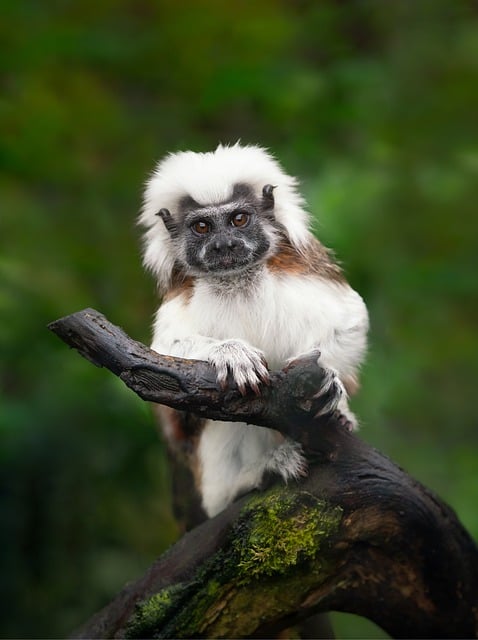In various religious texts and beliefs, animals are often mentioned as part of God’s creation and are valued for their role in the natural world. Different religions have different perspectives on animals and their treatment, but many emphasize the importance of compassion and stewardship towards all living beings.
Table of Contents
Animals in the Bible: A Comprehensive Study
Animals have always played a significant role in the lives of humans. From being companions to providing food and clothing, animals have been an integral part of our existence. But what does God say about animals? The Bible, the holy book of Christianity, provides us with insights into how God views and values animals.
In the book of Genesis, we see that God created animals on the same day as humans. This shows that animals hold a special place in God’s creation and are to be valued and respected. In Genesis 1:26, God gives humans dominion over the animals, but this does not mean that we have the right to mistreat or abuse them. Instead, it is a call to care for and steward God’s creation.
Throughout the Bible, we see examples of God’s care and concern for animals. In the book of Jonah, God shows compassion for the people and animals of Nineveh, sparing them from destruction. In Proverbs 12:10, we are reminded that “A righteous man cares for the needs of his animal,” highlighting the importance of treating animals with kindness and compassion.
Jesus also spoke about animals in his teachings. In Matthew 6:26, he tells his followers to look at the birds of the air, who do not sow or reap yet are provided for by God. This serves as a reminder that God cares for all of his creation, including animals. In Luke 12:6, Jesus reassures his disciples that not even a sparrow falls to the ground without God’s knowledge, emphasizing the value of even the smallest creatures in God’s eyes.
The Bible also contains stories of animals playing important roles in God’s plan. In the story of Noah’s Ark, God instructs Noah to bring two of every kind of animal onto the ark to save them from the flood. This shows God’s concern for the preservation of all living creatures. In the book of Numbers, God speaks through a donkey to warn Balaam of danger, demonstrating that animals can be used by God to communicate his messages to humans.
Overall, the Bible teaches us that animals are an important part of God’s creation and should be treated with care and respect. As stewards of God’s creation, it is our responsibility to care for animals and ensure their well-being. This includes providing for their physical needs, protecting them from harm, and showing them kindness and compassion.
In conclusion, the Bible provides us with valuable insights into how God views and values animals. From the creation story in Genesis to the teachings of Jesus, we see that animals hold a special place in God’s plan and are to be treated with care and respect. As followers of God, it is our duty to care for and protect animals, recognizing their importance in God’s creation. By following God’s example of compassion and care for animals, we can honor and glorify God in all that we do.
The Importance of Compassion Towards Animals in Religious Teachings
Have you ever wondered what God says about animals? Many religious teachings emphasize the importance of compassion towards animals, highlighting the interconnectedness of all living beings. In various religious texts, animals are often portrayed as sentient beings deserving of respect and kindness.
In Christianity, the Bible teaches that God created all living creatures and entrusted humans with the responsibility to care for them. In the book of Genesis, God gives Adam dominion over the animals, but this dominion is not meant to be one of exploitation or cruelty. Instead, it is a call to stewardship and compassion. The Bible also contains numerous verses that speak to the value of animals in God’s eyes. For example, Proverbs 12:10 states, “A righteous man cares for the needs of his animal,” emphasizing the importance of treating animals with kindness and consideration.
Similarly, in Islam, animals are seen as part of God’s creation and are to be treated with respect and compassion. The Prophet Muhammad is said to have shown great care and love towards animals, teaching his followers to do the same. In Islamic teachings, animals are considered to have their own rights, and mistreating them is seen as a sin. The Quran emphasizes the interconnectedness of all living beings, stating, “There is not an animal on earth, nor a bird that flies on its wings, but they are communities like you.”
In Hinduism, animals are revered as sacred beings, with many Hindus believing in the concept of ahimsa, or non-violence towards all living creatures. The cow, in particular, is considered a symbol of motherhood and fertility, and is often treated with great reverence. Many Hindus practice vegetarianism as a way to show compassion towards animals and to honor the interconnectedness of all life.
Buddhism also teaches compassion towards animals, with the belief that all beings are interconnected and deserving of respect. The first precept of Buddhism is to refrain from harming living beings, including animals. The Dalai Lama has spoken out against animal cruelty, stating, “Our prime purpose in this life is to help others. And if you can’t help them, at least don’t hurt them.”
In all of these religious traditions, the message is clear: animals are to be treated with kindness, respect, and compassion. As humans, we have a responsibility to care for the creatures that share our planet, recognizing that we are all interconnected in the web of life. By showing compassion towards animals, we are not only fulfilling our duty as stewards of God’s creation, but also cultivating a sense of empathy and love for all living beings.
So the next time you encounter an animal, whether it be a pet, a wild creature, or a farm animal, remember the teachings of your faith and treat them with kindness and respect. In doing so, you are not only honoring God’s creation, but also nurturing a sense of compassion and empathy that can benefit all beings, human and animal alike.
How Animals Reflect God’s Creation and Wisdom

Have you ever stopped to think about what God says about animals? It’s easy to overlook the significance of animals in the Bible, but they actually play a significant role in reflecting God’s creation and wisdom. From the very beginning, animals have been a part of God’s plan for the world, and they continue to teach us valuable lessons about His character and love.
In Genesis, we see that God created all living creatures, including animals, on the sixth day of creation. He gave them the ability to reproduce and fill the earth, showing His wisdom and foresight in providing for the needs of His creation. Animals are a testament to God’s creativity and power, each one uniquely designed to fulfill its role in the ecosystem.
Throughout the Bible, animals are used as symbols to teach us important lessons about God and His relationship with us. For example, in the book of Job, God uses the example of the behemoth and the leviathan to demonstrate His power and sovereignty over all creation. These creatures are described as mighty and untamable, showing that God is in control of even the most fearsome beasts.
Animals also serve as reminders of God’s provision and care for His people. In the book of Psalms, we are told that God provides for the needs of all His creatures, from the birds of the air to the beasts of the field. Just as He cares for the sparrows, so too does He care for us, His beloved children.
One of the most famous stories involving animals in the Bible is the story of Noah’s ark. God instructed Noah to build an ark and gather two of every kind of animal to save them from the flood. This story demonstrates God’s compassion for all His creation, not just humans. He values the lives of animals and wants to protect them from harm.
Animals also play a role in Jesus’ teachings. In the Gospels, Jesus often uses animals to illustrate spiritual truths. For example, He compares Himself to a shepherd who cares for His sheep, showing His love and concern for His followers. He also uses the example of a hen gathering her chicks under her wings to symbolize His desire to protect and nurture us.
In the book of Revelation, animals are once again used as symbols to convey important messages. The four living creatures surrounding God’s throne are described as having the faces of a lion, an ox, a man, and an eagle. These creatures represent different aspects of God’s character, such as strength, wisdom, humanity, and divinity.
Overall, animals are an integral part of God’s creation and plan for the world. They reflect His wisdom, power, and care for all living creatures. As we observe and interact with animals, we can learn valuable lessons about God’s character and love for us. So next time you see a bird soaring in the sky or a deer grazing in a meadow, take a moment to appreciate the beauty and complexity of God’s creation in the animal kingdom.
The Role of Animals in Biblical Stories and Parables
Animals have always played a significant role in biblical stories and parables, serving as important symbols and metaphors that convey deeper spiritual truths. Throughout the Bible, we see various animals mentioned, each with its own unique characteristics and symbolism. From the gentle lamb to the fierce lion, animals are used to illustrate different aspects of human nature and the divine plan.
One of the most well-known animals in the Bible is the lamb, which is often used to symbolize innocence and purity. In the Old Testament, lambs were commonly sacrificed as offerings to atone for sin. This sacrificial imagery is later echoed in the New Testament, where Jesus is referred to as the “Lamb of God” who takes away the sins of the world. The lamb serves as a powerful reminder of the ultimate sacrifice made for the redemption of humanity.
On the other end of the spectrum, we have the lion, a symbol of strength and power. In the Bible, lions are often used to represent God’s might and authority. For example, in the book of Daniel, the prophet is thrown into a den of lions as punishment for his faithfulness to God. However, God protects Daniel, and the lions do not harm him, showcasing God’s power over even the fiercest of creatures.
Animals are also used in parables to teach important lessons about faith, obedience, and humility. In the parable of the lost sheep, Jesus compares himself to a shepherd who leaves the ninety-nine sheep to search for the one that has gone astray. This parable illustrates God’s relentless pursuit of those who have strayed from his path, emphasizing his love and care for each individual.
Similarly, in the parable of the prodigal son, a father welcomes back his wayward son with open arms, symbolizing God’s unconditional love and forgiveness. The father’s joy at the return of his son mirrors God’s delight when a sinner repents and turns back to him. Animals are used in these parables to convey profound truths about God’s character and his relationship with humanity.
Throughout the Bible, animals are also used to illustrate moral lessons and virtues. For example, the ant is praised for its diligence and hard work in the book of Proverbs, serving as a model of industry and wisdom. The eagle is used to symbolize God’s protection and care, as it watches over its young with great vigilance.
In conclusion, animals play a crucial role in biblical stories and parables, serving as powerful symbols that convey deeper spiritual truths. Whether it be the sacrificial lamb, the mighty lion, or the diligent ant, each animal serves to teach us something about God’s character and his relationship with humanity. By studying these animal metaphors, we can gain a deeper understanding of the divine plan and our place within it. God’s creation is rich with symbolism and meaning, and animals are just one of the many ways in which he communicates his love and wisdom to us.
Understanding the Spiritual Connection Between Humans and Animals
Have you ever wondered what God says about animals? The Bible is full of references to animals, showcasing their importance in the eyes of God. From the creation story in Genesis to the parables told by Jesus, animals play a significant role in the spiritual connection between humans and the natural world.
In Genesis, God creates the animals on the same day as humans, emphasizing their equal importance in the eyes of God. This creation story highlights the interconnectedness of all living beings and the responsibility humans have to care for and protect the animals that share the Earth with us.
Throughout the Bible, animals are used as symbols to convey important spiritual truths. For example, the lamb is often used to represent innocence and purity, while the lion symbolizes strength and power. These symbolic representations remind us of the diverse qualities that animals possess and the lessons we can learn from observing their behavior in the wild.
Jesus frequently used animals in his parables to teach important lessons about love, compassion, and forgiveness. In the parable of the Good Samaritan, Jesus tells the story of a man who is beaten and left for dead on the side of the road. It is a Samaritan, traditionally seen as an outsider, who stops to help the man, showing compassion and kindness. This parable teaches us the importance of caring for others, regardless of their background or beliefs.
Animals are also mentioned in the context of God’s provision and care for all living beings. In the book of Matthew, Jesus reminds his followers that God feeds the birds of the air and clothes the lilies of the field, demonstrating his abundant love and care for all of creation. This passage serves as a powerful reminder of God’s provision and the importance of trusting in his plan for our lives.
The Bible also speaks to the role of animals in the afterlife. In the book of Revelation, John describes a vision of heaven where animals are present, praising God alongside humans. This depiction of animals in heaven reinforces the idea that all living beings are valued and loved by God, regardless of their species.
As Christians, it is important to remember our responsibility to care for and protect the animals that share our world. This includes advocating for animal welfare, supporting conservation efforts, and treating all living beings with respect and compassion. By honoring the spiritual connection between humans and animals, we can better understand God’s love for all of creation and live out our faith in a way that reflects his values.
In conclusion, the Bible is clear about the importance of animals in God’s eyes. From the creation story in Genesis to the teachings of Jesus, animals play a significant role in the spiritual connection between humans and the natural world. By recognizing the value of animals and treating them with care and compassion, we can honor God’s creation and live out our faith in a way that reflects his love for all living beings.
Conclusion
God values animals and has given them a place in creation. In the Bible, animals are seen as part of God’s good creation and are to be cared for and respected by humans. God also shows concern for the well-being of animals, as seen in verses such as Proverbs 12:10 which states, “A righteous man cares for the needs of his animal.” Ultimately, God’s love and care for animals is reflected in the way humans are called to treat them with kindness and compassion.
For licensing reasons, we must provide the following notice: This content was created in part with the help of an AI.


